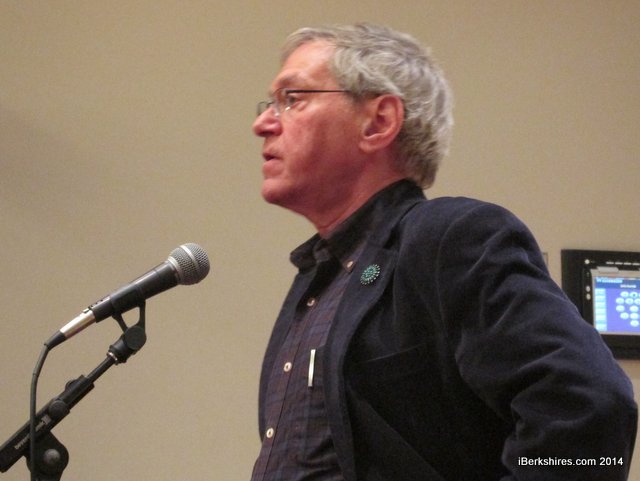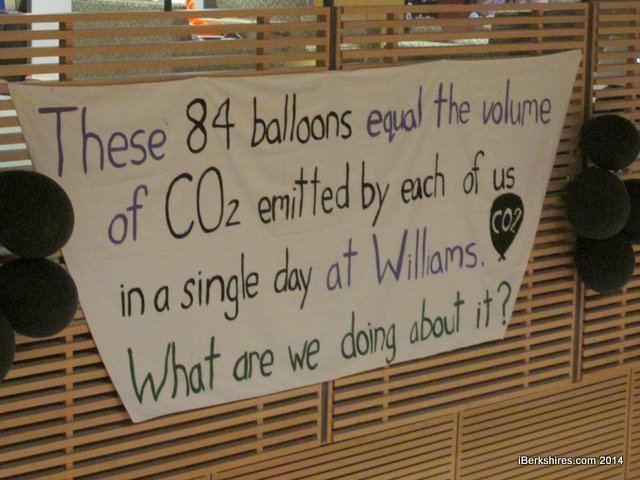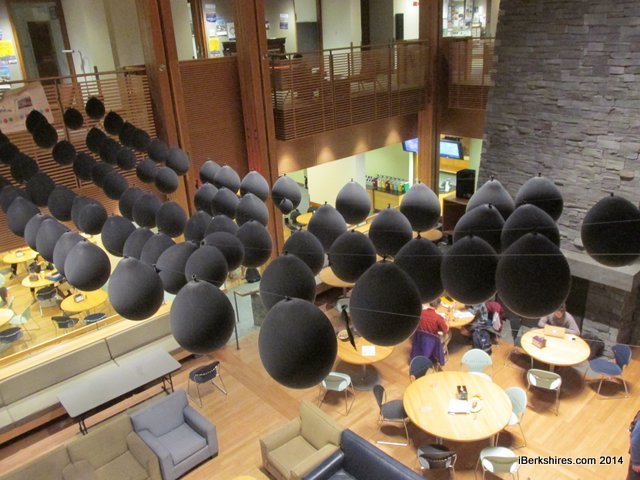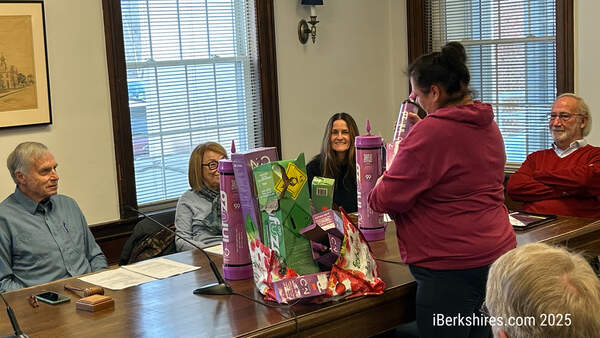Earth Day Speaker: Break Carbon Addiction, Go After 'Pushers'
 Michael Klare, the director of the Five College Program in Peace and World Security Studies at Hampshire College, spoke with Williams students about divesting in fossil fuels. Michael Klare, the director of the Five College Program in Peace and World Security Studies at Hampshire College, spoke with Williams students about divesting in fossil fuels. |
WILLIAMSTOWN, Mass. — The Earth's ecosystem is diseased, and it is humanity's sickness that is the cause.
That was the message delivered Tuesday evening at Williams College by Michael Klare, the director of the Five College Program in Peace and World Security Studies at Hampshire College.
Klare was on campus to deliver the college's keynote address for Earth Day, and he said that Earth's days are numbered — at least Earth as we know it.
The result will be "mean surface temperature increases in 2100 from 3.7 to 4.8 degrees Celsius compared to pre-industrial levels," the IPCC reports.
Mankind's failure to curb its carbon emissions flies in the face of decades of scientific evidence, but Klare said the irrational behavior is perfectly understandable.
We're addicted to fossil fuels.
Treating the addiction like any other — complete with attacks on the "pushers" — is the only way to win the war on carbon, he said.
Like any other addictive substance — alcohol, heroin, tobacco — fossil fuels are habit forming because they give short-term pleasure. The difference is while the other addictions are personal, society's dependence on carbon-based fuels is global.
"It's a curse because on the one hand fossil fuels are incredibly attractive," Klare said. "They are the most useful, productive, efficient form of energy every created by humans. ... The allure of fossil fuels is never ending. We want to keep driving, want to heat our homes, want to travel more, to fly more.
"Not only that, but there are billions of people on Earth who do not enjoy the lifestyle we enjoy — in China, India, Turkey ... They don't enjoy these benefits and they want them. They want fossil fuels and all the benefits that come with them."
And just as surely as an alcoholic's addiction wreaks havoc with his or her body and mind or a smoker's addiction can cause cancer, humanity's addiction to oil and coal has deadly consequences, Klare said.
Seen through the prism of addiction, the ever increasing production of greenhouse gasses is understandable, and the results are just as predictable.
Klare told his audience of about 40 in Williams' Paresky Center that the apathy most people show toward climate change is a symptom of denial — again typical of addictive behavior.
"Most people understand it's a problem of that magnitude but are very reluctant to address it because it's hard," Klare said. "People are in denial.
"What's going to shake them out of that is Mother Nature is not forgiving. Mother Nature is going to deliver her own message."
Again citing the UN-sponsored report, Klare referred to rising sea levels, disruptions in the food supply and a worldwide pandemic that threatens humanity on the scale of thermonuclear war or a global virus.
In fact, he said it is time to think about fossil fuels as not an "environmental issue" but a public health emergency.
"We're talking about an existential threat to human survival," he said. "The only way to stop climate change is by adopting an anticarbon strategy that sees this as a threat like tobacco."
To break our addiction to fossil fuels, Klare prescribed a "two-step program."
The first step involves conservation and the aggressive development of renewable energy.
The second step: Go after the pushers.
Klare did not mince words when it came to his "second step."
"They will use all the means at their disposal, which are immense, to thwart our efforts, to sabotage our efforts," Klare said of multinational and, sometimes, statist oil companies like British Petroleum, Exxon Mobil and Russia's Gazprom.
"They have to be demonized and isolated and portrayed as being a threat to human survival the same way tobacco companies were portrayed that way. I'm sure Williams College does not have in its endowment tobacco stocks. That's because everybody got rid of them years ago. I'm sure at the time, they bragged — here and at other schools — about the great thing they were doing by disposing of those stocks because they posed a threat to human health.
"It's the same with fossil fuels."
Klare's appearance at Williams was sponsored by the college's Center for Environmental Studies and the student-led Thursday Night Group. The latter group has been trying to
pressure the college to dump fossil fuel companies from Williams' investment portfolio.
Klare said divestment can be a powerful tool — both by hurting the oil companies economically and be sending a strong political message. He cited no less an authority than Nobel prize winner
Archbishop Desmond Tutu, who recently wrote, "People of conscience need to break their ties with corporations financing the injustice of climate change. We can, for instance, boycott events, sports teams and media programming sponsored by fossil-fuel energy companies."
Although the first step in Klare's program to end fossil fuel addiction was readily embraced by the crowd at the Paresky Center, his call to demonize the oil companies met some with some skepticism.
During the evening's question and answer period, one member of the audience questioned the efficacy of divestment as an economic tool against big oil. Another listener asked Klare if it might make more sense to engage the oil companies and encourage them to step up their own efforts to develop alternative energy sources.
To the first respondent, Klare said divestment hits companies where they live — in the pocketbook — and helps reduce the capital they have to go after oil shale and deepwater drilling projects.
To the second, Klare scoffed at the notion that companies like BP, which launched a "Beyond Petroleum" ad campaign that many call "greenwashing," will seriously work to develop renewables.
"These companies may be spending a few pennies of their profits on alternatives, but they're spending trillions to perpetuate the fossil fuel dependence we have," Klare said. "I don't see where you can partner with them ... even though I understand the instinct to do that."
"These people are pariahs. They're selling a product that is going to kill our children and grandchildren. That's why divestment is a useful strategy."
Tags: endowment, energy, environment, Williams College,
 Michael Klare, the director of the Five College Program in Peace and World Security Studies at Hampshire College, spoke with Williams students about divesting in fossil fuels.
Michael Klare, the director of the Five College Program in Peace and World Security Studies at Hampshire College, spoke with Williams students about divesting in fossil fuels.
















